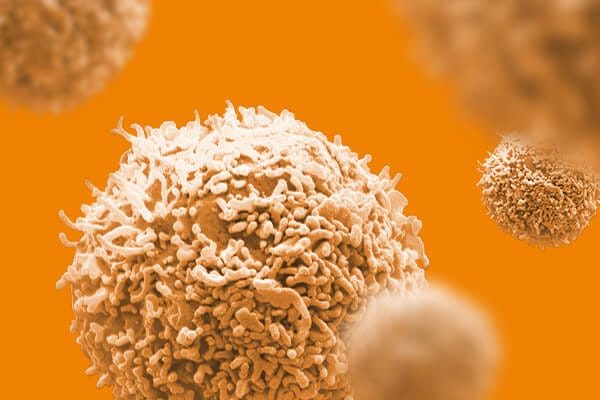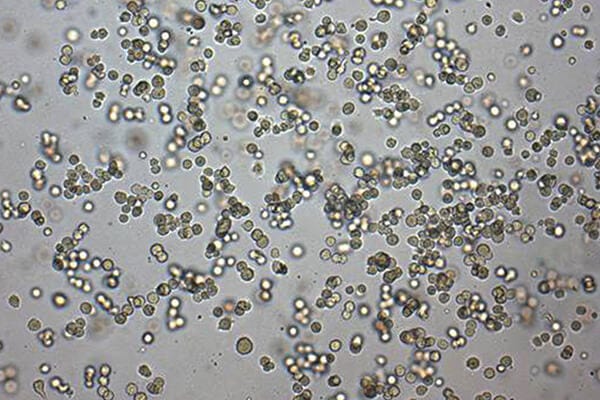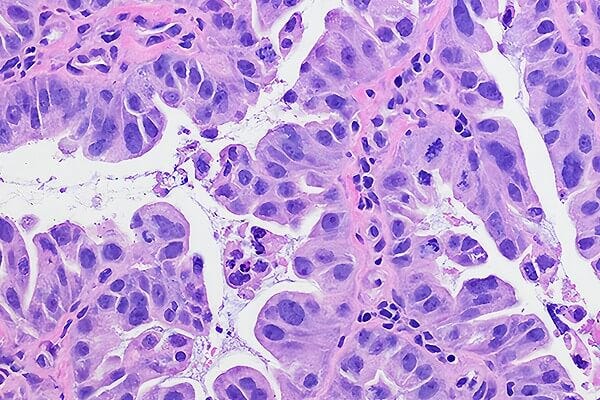Scientific Resources
-
 文献Quintarelli C et al. (MAR 2011) Blood 117 12 3353--62
文献Quintarelli C et al. (MAR 2011) Blood 117 12 3353--62High-avidity cytotoxic T lymphocytes specific for a new PRAME-derived peptide can target leukemic and leukemic-precursor cells.
The cancer testis antigen (CTA) preferentially expressed antigen of melanoma (PRAME) is overexpressed by many hematologic malignancies,but is absent on normal tissues,including hematopoietic progenitor cells,and may therefore be an appropriate candidate for T cell-mediated immunotherapy. Because it is likely that an effective antitumor response will require high-avidity,PRAME-specific cytotoxic T lymphocytes (CTLs),we attempted to generate such CTLs using professional and artificial antigen-presenting cells loaded with a peptide library spanning the entire PRAME protein and consisting of 125 synthetic pentadecapeptides overlapping by 11 amino acids. We successfully generated polyclonal,PRAME-specific CTL lines and elicited high-avidity CTLs,with a high proportion of cells recognizing a previously uninvestigated HLA-A*02-restricted epitope,P435-9mer (NLTHVLYPV). These PRAME-CTLs could be generated both from normal donors and from subjects with PRAME(+) hematologic malignancies. The cytotoxic activity of our PRAME-specific CTLs was directed not only against leukemic blasts,but also against leukemic progenitor cells as assessed by colony-forming-inhibition assays,which have been implicated in leukemia relapse. These PRAME-directed CTLs did not affect normal hematopoietic progenitors,indicating that this approach may be of value for immunotherapy of PRAME(+) hematologic malignancies. View Publication -
 文献Esplugues E et al. (JUN 2005) Blood 105 11 4399--406
文献Esplugues E et al. (JUN 2005) Blood 105 11 4399--406Induction of tumor NK-cell immunity by anti-CD69 antibody therapy.
The leukocyte activation marker CD69 is a novel regulator of the immune response,modulating the production of cytokines including transforming growth factor-beta (TGF-beta). We have generated an antimurine CD69 monoclonal antibody (mAb),CD69.2.2,which down-regulates CD69 expression in vivo but does not deplete CD69-expressing cells. Therapeutic administration of CD69.2.2 to wild-type mice induces significant natural killer (NK) cell-dependent antitumor responses to major histocompatibility complex (MHC) class I low RMA-S lymphomas and to RM-1 prostatic carcinoma lung metastases. These in vivo antitumor responses are comparable to those seen in CD69(-/-) mice. Enhanced host NK cytotoxic activity correlates with a reduction in NK-cell TGF-beta production and is independent of tumor priming. In vitro studies demonstrate the novel ability of anti-CD69 mAbs to activate resting NK cells in an Fc receptor-independent manner,resulting in a substantial increase in both NK-cell cytolytic activity and interferon gamma (IFNgamma) production. Modulation of the innate immune system with monoclonal antibodies to host CD69 thus provides a novel means to antagonize tumor growth and metastasis. View Publication -
 文献Esplugues E et al. (MAY 2003) The Journal of experimental medicine 197 9 1093--106
文献Esplugues E et al. (MAY 2003) The Journal of experimental medicine 197 9 1093--106Enhanced antitumor immunity in mice deficient in CD69.
We investigated the in vivo role of CD69 by analyzing the susceptibility of CD69-/- mice to tumors. CD69-/- mice challenged with MHC class I- tumors (RMA-S and RM-1) showed greatly reduced tumor growth and prolonged survival compared with wild-type (WT) mice. The enhanced anti-tumor response was NK cell and T lymphocyte-mediated,and was due,at least in part,to an increase in local lymphocytes. Resistance of CD69-/- mice to MHC class I- tumor growth was also associated with increased production of the chemokine MCP-1,diminished TGF-beta production,and decreased lymphocyte apoptosis. Moreover,the in vivo blockade of TGF-beta in WT mice resulted in enhanced anti-tumor response. In addition,CD69 engagement induced NK and T cell production of TGF-beta,directly linking CD69 signaling to TGF-beta regulation. Furthermore,anti-CD69 antibody treatment in WT mice induced a specific down-regulation in CD69 expression that resulted in augmented anti-tumor response. These data unmask a novel role for CD69 as a negative regulator of anti-tumor responses and show the possibility of a novel approach for the therapy of tumors. View Publication
过滤器
筛选结果
类别
- Educational Materials
- Areas of Interest
- Methods Library
Show More
Show Less
产品系列
- MethoCult 1 项目
- StemSpan 2 项目
Show More
Show Less
资源类别
- 文献 3 项目
Show More
Show Less
细胞类型
- B 细胞 134 项目
- CD4+ 84 项目
- CD8+ 48 项目
- Endoderm 1 项目
- Neural Cells 17 项目
- NK 细胞 79 项目
- PSC-Derived 18 项目
- PSC衍生 6 项目
- Regulatory 11 项目
- T Cells 56 项目
- T 细胞 252 项目
- 上皮细胞 47 项目
- 乳腺细胞 68 项目
- 先天性淋巴细胞 3 项目
- 内皮细胞 2 项目
- 前列腺细胞 7 项目
- 单核细胞 106 项目
- 多能干细胞 1692 项目
- 心肌细胞 3 项目
- 杂交瘤细胞 76 项目
- 树突状细胞(DCs) 59 项目
- 气道细胞 40 项目
- 癌细胞及细胞系 116 项目
- 白细胞单采样本 1 项目
- 白血病/淋巴瘤细胞 8 项目
- 真皮细胞 1 项目
- 神经元 136 项目
- 神经干/祖细胞 384 项目
- 神经细胞 2 项目
- 粒细胞及其亚群 61 项目
- 肝细胞 3 项目
- 肠道细胞 13 项目
- 肾脏细胞 2 项目
- 脑肿瘤干细胞 81 项目
- 血小板 1 项目
- 血浆 3 项目
- 调节性细胞 7 项目
- 造血干/祖细胞 779 项目
- 间充质干/祖细胞 133 项目
- 髓系细胞 99 项目
Show More
Show Less


 EasySep™小鼠TIL(CD45)正选试剂盒
EasySep™小鼠TIL(CD45)正选试剂盒





 沪公网安备31010102008431号
沪公网安备31010102008431号